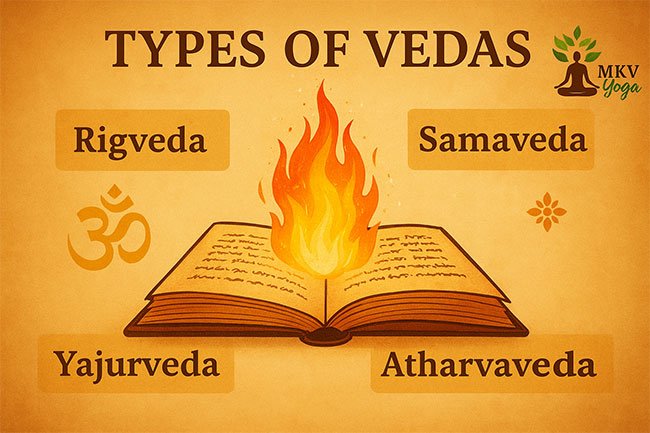The Vedas are the most ancient and sacred scriptures of Hinduism, considered timeless sources of divine knowledge. They form the foundation of Sanatan Dharma and are revered as the guiding light for spiritual, moral, and practical living. Written in Sanskrit, the Vedas are not merely religious texts but a treasure house of universal wisdom.
There are four main types of Vedas: Rigveda, Samaveda, Yajurveda, and Atharvaveda. Each Veda has its own unique purpose, hymns, and teachings that contribute to the holistic understanding of life and spirituality. Together, they encompass prayers, rituals, philosophy, healing methods, and even scientific knowledge.
In this blog, let us explore the various types of Vedas, their meanings, and their enduring importance.
Table of Contents
1. Rigveda – The Oldest Veda
-
Meaning: Rigveda is the oldest of the Vedas, composed of hymns (Richa) dedicated to various deities.
-
Content: It contains over 1,000 hymns (suktas) that praise gods like Agni (Fire), Indra (Rain & Thunder), Varuna (Cosmic Order), and others.
-
Significance: Rigveda emphasizes devotion, cosmic order, and the power of mantra chanting. It also provides insights into early Vedic culture, philosophy, and social structure.
2. Samaveda – The Veda of Melodies
-
Meaning: Samaveda is the “Veda of music” or chants, as it transforms Rigvedic hymns into melodic patterns.
-
Content: It primarily comprises verses from the Rigveda, presented in a format suitable for singing during rituals.
-
Significance: Samaveda laid the foundation for Indian classical music and is closely associated with yajnas (sacrificial rituals). It teaches the importance of rhythm, harmony, and devotion in spiritual practice.
3. Yajurveda – The Veda of Rituals
-
Meaning: Yajurveda is focused on rituals, sacrifices, and mantras used in yajnas.
-
Content: It is divided into two parts – Shukla Yajurveda (White Yajurveda) and Krishna Yajurveda (Black Yajurveda). These contain instructions and mantras for priests performing sacred rituals.
-
Significance: Yajurveda provides practical guidance for living a disciplined, righteous, and spiritually aligned life through rituals and sacrifices.
4. Atharvaveda – The Veda of Everyday Life
-
Meaning: Atharvaveda is unique as it deals not only with spirituality but also with daily life issues.
-
Content: It includes hymns for healing, protection from diseases, success in ventures, and remedies for various challenges.
-
Significance: Atharvaveda reflects the practical aspects of Vedic wisdom and is considered the most approachable Veda for the common people.
Importance of the Four Vedas
The types of Vedas together form a complete path of knowledge:
-
Rigveda inspires devotion and wisdom.
-
Samaveda elevates the spirit through music.
-
Yajurveda gives discipline through rituals.
-
Atharvaveda helps in solving day-to-day challenges.
These Vedas are not just ancient texts but living traditions that continue to inspire seekers of truth, peace, and enlightenment even today.
Conclusion
The types of Vedas – Rigveda, Samaveda, Yajurveda, and Atharvaveda – are treasures of divine wisdom that cover every aspect of human life. They guide us in spirituality, morality, science, music, health, and rituals, making them timeless scriptures of humanity. By studying and practicing their teachings, one can move towards a life of balance, peace, and ultimate realization.
FAQs on Types of Vedas
Q1. How many types of Vedas are there?
There are four types of Vedas – Rigveda, Yajurveda, Samaveda, and Atharvaveda. Together, they form the foundation of Vedic knowledge.
Q2. What is the importance of the Rigveda?The
Rigveda is considered the oldest Veda. It contains hymns (Richa) dedicated to various deities and is used in prayers and rituals.
Q3. What is the purpose of the Yajurveda?
Yajurveda focuses on rituals, sacrifices, and the proper procedures of yajnas. It guides priests and practitioners in performing sacred ceremonies.
Q4. Why is the Samaveda called the origin of music?
Samaveda presents Rigvedic verses in a musical form, making it the basis of Indian classical music and spiritual chanting.
Q5. What does the Atharvaveda deal with?
Atharvaveda covers daily life issues, healing practices, Ayurveda, household rituals, and mantras for protection and well-being.
Q6. Why is studying the Vedas important?
The Vedas are not just religious texts but also contain knowledge of life, science, philosophy, health, and spirituality, helping one lead a balanced and enlightened life.
You may like to read –

